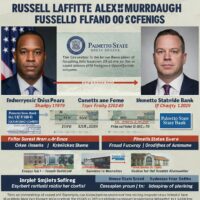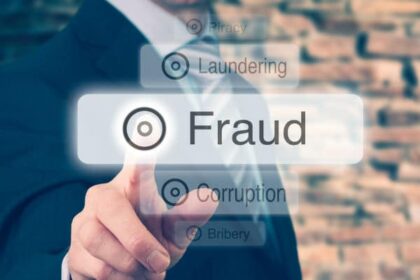Mecklenburg Co. Man Facing Federal Charges In Connection With $19 Million Investment Fraud Scheme
Defendant Misused Victim-Investors’ Funds to Pay for Vacation Homes, Vehicles, a Chef and Other Personal Expenses
CHARLOTTE, N.C. – A Mecklenburg Co. man is facing federal charges in connection with an investment scheme that defrauded 100 victims of $19 million, announced Jill Westmoreland Rose, U.S. Attorney for the Western District of North Carolina. A federal grand jury returned a criminal indictment against Richard Wyatt Davis, Jr., a.k.a. Rich Davis, 40, on Tuesday, December 13, 2016, charging him with one count of wire fraud, two counts of securities fraud, and three counts of tax evasion. The indictment was unsealed today following Davis’s arrest by law enforcement.
U.S. Attorney Jill Westmoreland Rose is joined in making today’s announcement by Michael Rolin, Special Agent in Charge of the United States Secret Service, Charlotte Field Division and Michael C. Daniels, Acting Special Agent in Charge of the Internal Revenue Service, Criminal Investigation Division, Charlotte Field Office (IRS-CI).
According to allegations contained in the indictment:
From approximately 2005 and continuing through in or about 2016, Davis defrauded more than 100 investors of more than $19 million by inducing his victims to invest in fraudulent investment funds controlled by him, including the DCG Commercial Fund I and DCG Real Assets, as well as other fraudulent investment vehicles (collectively, Davis Entities). In order to recruit his victim-investors, Davis made false misrepresentations regarding his credentials, including his educational background and about being a Registered Financial Consultant. Davis also purported to victim-investors that his fraudulent investment vehicles were low risk investments involving real estate, precious metals, and natural resources and touted the investments as a safe alternative to the stock market. Davis also falsely assured victim-investors that their investments were growing in value. For example, Davis falsely represented to a number of investors that Davis Entities transactions had received an average net internal rate of return of 32% percent, which was not true. As a result of his many lies and falsehoods, Davis’s investors frequently rolled over their entire retirement savings into entities controlled by the defendant.
Davis generally targeted investors residing in and around Charlotte, N.C. His clients included professional athletes and individuals who were recruited through Davis’s church. Davis also spoke at events for “preppers” and survivalists, thereby targeting victim-investors who were fearful of the stock market and the banking system. Davis preyed upon these investors’ fears of traditional financial markets and took advantage of their trust into someone who shared their religious views.
Contrary to promises made to his investors, in reality Davis invested none of the victims’ money. Rather, Davis transferred the majority of the victims’ funds to other entities he controlled, and used some of the money to make Ponzi-style payments to earlier investors in an effort to conceal and prolong the scheme. Davis also diverted victim-investors’ money to support his personal lifestyle, including to pay for his and his then wife’s personal credit cards, mortgage payments, nannies, a groundskeeper, a personal chef, vehicles, significant cash withdrawals, payments to family members, and to pay for large administrative and overhead expenses that did not increase value for investors.
To avoid fulfilling victim withdrawals requests, Davis provided numerous excuses, including that the victims’ money was unavailable because the funds were tied up in investments with specific maturity periods. Davis also falsely advised victims that they needed to invest additional funds in order to secure the return to their original investment. Davis was also frequently evasive or failed to report to investors’ inquiries about the status of their investments, and even threatened to discontinue managing the investments if investors asked for too much information.
The indictment also alleges that Davis filed false tax returns for 2009 and 2011 which reflected negative total income. Davis also failed to file individual income tax returns for 2010 and 2012. During the same time period, Davis submitted various financial statements to banks and courts, claiming his annual income was anywhere between $385,000 and upwards of $1.5 million.
Davis had his initial appearance today before U.S. Magistrate Judge David Keesler. Davis was ordered to remain in custody until his detention hearing, which was scheduled for December 20, 2016.
The wire fraud charge carries a maximum prison term of 30 years and a $1 million fine. The securities fraud charge carries a maximum prison term of 20 years and a $250,000 fine per count. And the maximum prison term for the tax evasion charge is five years and a $250,000 fine per count.
All the charges contained in the indictment are allegations. The defendant is presumed innocent until proven guilty beyond reasonable doubt in a court of law.
In making today’s announcement U.S. Attorney Rose thanked the U.S. Secret Service and the IRS for leading the joint investigation.
Assistant U.S. Attorney Jenny G. Sugar, of the U.S. Attorney’s Office in Charlotte, is in charge of the prosecution.In June 2016, the U.S. Securities and Exchange Commission (SEC) filed a civil complaint against Davis. Without admitting or denying the allegations, Davis has entered into a partial settlement with the SEC, which bars him from any further sale of securities in a pooled investment vehicle, as well as from future violations of antifraud and securities registration provisions of the federal securities laws. Davis is also required to cooperate with a court-appointed receiver. See https://www.sec.gov/litigation/litreleases/2016/lr23554.htm














